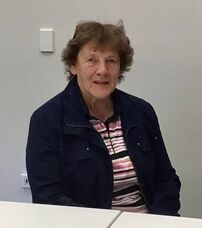Seeing that we couldn’t afford to live out in the bush where I would have the peace and quiet that I craved, Goorambat was the next best thing.
For three years we had enjoyed lived in the farm cottage by the banks of the Broken River. In 1973 with the sale of the family property it was time to move on.
Don was a high-level quadriplegic from a diving accident in years past, so he couldn’t help with the move. The people we were buying the house from were in the same boat. The husband was recovering in a Melbourne hospital after open heart surgery, so we were two women managing the best we could.
It was evening when we moved into Main St Goorambat. Gwen still had open topped boxes in the living room, so I put my boxes alongside. I was tired so just threw my purse into one of them. Don also tossed his wallet into one of the boxes without looking.
“What’s for tea?” I told him I had only brought enough food for a light tea and breakfast, and I would shop in the morning.
The night was almost consumed with juggling furniture around. After midnight the ancient Queen Anne bed was still on the floor in pieces. Don said, “Go and get Ray from next door to help you.” “No, I’m new in town and I’m not going to be a nuisance.”
At three a.m. I was looking forward to a nice hot bath with water that wasn’t straight from the Broken River. Horror, this was worse, it was dark brown with mud from the Broken Creek!
At 5 am we were woken by an unholy racket; it was the twice a week goods train stopping opposite the house to unload supplies and barrels for the Pub.
In our tired state we had no idea which boxes contained the money. At lunch time Don said, “Just go to the store and ask for credit.” “No, I’m not going to have anyone think that we’re going to be a nuisance in this town.”
The sun was setting when we found the wallet. I still remember the intense joy of that moment. We said, “Let’s go to the Royal for tea to celebrate, we can pick up the cat from the cottage on the way back.”
We got used to the early goods train and the grain trucks being loaded from the silos at three in the morning, with the slamming of lids and the crash of each rail trucks buffers colliding as they careered down the track after being filled.
Most people in the district were related and were proud of their family connections. I soon found that the quickest way to be accepted was to have knowledge of the extended family trees.
With the early 1970’s drought, farmer’s sons were moving away for other employment. The small mixed farms surrounding Goorambat were about to be swallowed up by larger acreages. Small towns were struggling, but social division of the sexes was still alive and well. In the town there was men’s work and women’s work, and no one crossed the line. But the winds of change were blowing.
Victory Park was looked after by the local members of the R.S.L. who were mostly farmers. When Don returned home with a request from the men for me to cut the grass in the Park, as they were busy with the harvest, I knew there would be trouble. It nearly caused a revolt from the town’s women who wanted to know why I was doing the men’s work.
When Don passed away, I inherited his position as Goorambat Football Club Treasurer. When I also became the Secretary, there was another bunch of very indignant women to deal with and I found the first nails placed under my car’s tyres!
At the Presentation Night I was awarded the Best Clubman trophy. When it was asked if it should be ‘Club Person’, the men said “No, she belongs to the men’s committee” and I got more nails in my tyres.
I treasure my Clubman of the Year trophy. There was no ‘person’ nonsense then. I was appreciated and it was not long before I was considered a local.
Times and attitudes have changed. It doesn’t matter if you are a newcomer or whether you are male or female. Now we all work together for the good of the community.
Bev Morton
March 2021


 RSS Feed
RSS Feed
